人教版七年级英语下册Unit2 reading What Do No. 5 High School Students Do in Their Free Time第四课时
- 格式:ppt
- 大小:187.00 KB
- 文档页数:16
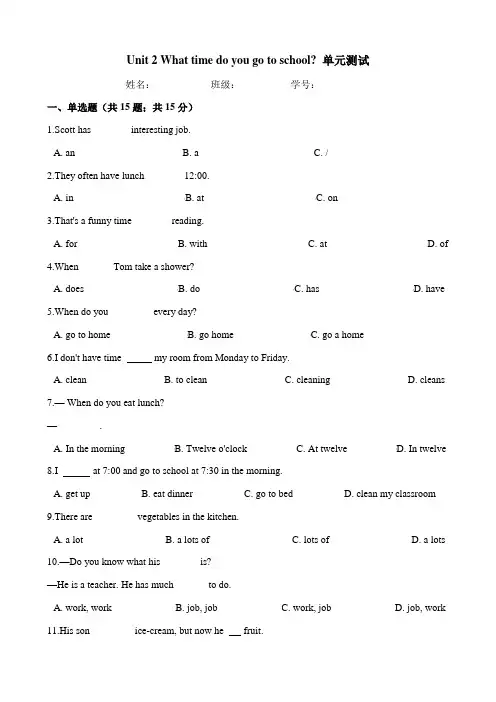
Unit 2 What time do you go to school? 单元测试姓名:__________ 班级:__________学号:__________一、单选题(共15题;共15分)1.Scott has _______ interesting job.A. anB. aC. /2.They often have lunch _______ 12:00.A. inB. atC. on3.That's a funny time _______ reading.A. forB. withC. atD. of4.When ______ Tom take a shower?A. doesB. doC. hasD. have5.When do you ________ every day?A. go to homeB. go homeC. go a home6.I don't have time my room from Monday to Friday.A. cleanB. to cleanC. cleaningD. cleans7.— When do you eat lunch?— ________.A. In the morningB. Twelve o'clockC. At twelveD. In twelve8.I at 7:00 and go to school at 7:30 in the morning.A. get upB. eat dinnerC. go to bedD. clean my classroom9.There are ________ vegetables in the kitchen.A. a lotB. a lots ofC. lots ofD. a lots10.—Do you know what his _______ is?—He is a teacher. He has much ______ to do.A. work, workB. job, jobC. work, jobD. job, work11.His son ________ ice-cream, but now he fruit.A. used to eat; is used to eatingB. used to eating; eatsC. is used to eating; used to catD. is used to eat; is eating12.The girl decided ____ for a walk in the forest.A. goB. to goC. goingD. goes13.Mike often exercises _________ half an hour in the morning.A. atB. ofC. withD. for14.I sometimes play tennis for half hour.A. aB. anC. /D. the15.Tina goes __________ after __________ school at four thirty.A. home, theB. home; /C. to home, theD. to home;/二、完形填空(共10分)Julie is my aunt and she works at a radio station. She 1 it is an interesting job. Today I ask her about 2 life.She says she is very busy from Monday to Friday. She goes to work at 7:30 and 3at 20:00. Then she watches TV 4 half an hour. She goes to bed at 21:00. On Saturdays, she either plays tennis 5 goes swimming. They are 6for her. What does she 7 do on Sundays? She always goes to the dance club. She is good at 8 . My last question is not easy for her. I ask, “You like dancing.9 not be a dancer?” She says, “I likes to talk to people through (通过) the10 . I can help more people in this way. Dancing is just my hobby (爱好), not my job.”1. A. thinks B. wants C. asks D. tastes2. A. his B. her C. our D. their3. A. goes home B. gets dressed C. gets up D. goes to bed4. A. of B. for C. with D. on5. A. but B. so C. and D. or6. A. relaxing B. boring C. clean D. short7. A. never B. also C. usually D. sometimes8. A. running B. dancing C. teaching D. speaking9. A. Where B. How C. Why D. When10. A. club B. group C. year D. radio三、阅读理解(共2题;共20分)(一)My name is Jackie. I get up at 7:00 a.m. For breakfast, I have some bread and eggs. Then I walk to school with my friends.At 9:00 a.m., we have English, art, P.E. or French (法语). I like French best. At 10:30 a.m., we can play sports or talk. At 10:45 a.m., it is our free reading (阅读) time.At 11:50 p.m., I go home for lunch. I have hamburgers and milk.At 1:00 p.m., I get to school. On Wednesday and Thursday afternoons, we do Book Buddies. Old students help us read, write and do math. On Friday afternoons, we play chess in the classroom.At 3:00 p.m., our class finishes. Then I do my homework. At 5:00 p.m., I watch TV. At 6:00 p.m., we have vegetables and chicken (鸡肉). At 8:30 p.m., I go to bed.(1)What subject does Jackie like best?()A.English.B.Art.C.Science.D.French.(2)What does Jackie do at 10:30? ()A.He has lessons.B.He plays sports or talks.C.He reads books.D.He plays chess. (3)When does Jackie watch TV? ()A.At 3:50 p.m.B.At 4:50 p.m.C.At 5:00 p.m.D.At 6:30 p.m.(4)What does Jackie have for dinner? ()A.Bread and eggs.B.Hamburgers and milk.C.Fish and salad.D.Vegetables and chicken. (5)What can we learn from the passage? ()A.Jackie goes to school with his friends.B.Jackie has his first lesson at 8:30 a.m.C.Jackie has lunch at school.D.On Thursday afternoons, Jackie can play chess.(二)Dear Jennifer,It's Tuesday, February 11th. I'm really busy today. At 8 o'clock I have a math class.I don't like math class. Then I have a science class. It's difficult, but It's interesting. Next, at 10:00, I have a history. It's boring. But I have PE at 11:00. That's my favorite subject. I have lunch at 12:00. After lunch. I have a music class. I like my music teacher, Mr. Morgan. He is a fun teacher. School is over at 2:00. After school I do sports for two hours. I'm so tired, but I'm very happy.Yours,Linda (1)This is a letter from ______.A.JenniferB.LindaC.Mr.MorganD.Lin Da(2)The author (作者) has _______ classes in the morning.A.twoB.threeC.fourD.five(3)The author's likes ______ class best.A.scienceB.PEC.musicD.math(4)The fun teacher teaches _______.A.PEB.historyC.scienceD.music(5)_______ is true(正确的).A.The author likes the PE teacher.B.School is over at 12:00.C.The author do sports after school.D.The author thinks history is interesting.四、翻译(共3题;共20分)根据汉语意思完成英语句子,每空一词。
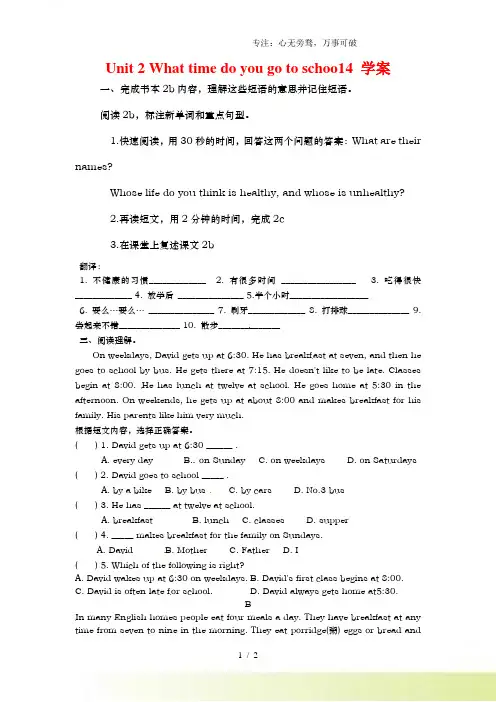
Unit 2 What time do you go to schoo14 学案一、完成书本2b内容,理解这些短语的意思并记住短语。
阅读2b,标注新单词和重点句型。
1.快速阅读,用30秒的时间,回答这两个问题的答案:What are their names?Whose life do you think is healthy, and whose is unhealthy?2.再读短文,用2分钟的时间,完成2c3.在课堂上复述课文2b翻译:1. 不健康的习惯_____________2. 有很多时间_________________3. 吃得很快_____________4. 放学后_______________5.半个小时__________________6. 要么…要么…_______________7. 刷牙_____________8. 打排球______________9. 尝起来不错______________ 10. 散步______________三、阅读理解。
On weekdays, David gets up at 6:30. He has breakf ast at seven, and then he goes to school by bus. He gets there at 7:15. He doesn't like to be late. Classes begin at 8:00. He has lunch at twelve at school. He goes home at 5:30 in the afternoon. On weekends, he gets up at about 8:00 and makes breakfast for his family. His parents like him very much.根据短文内容,选择正确答案。

1.hard-working“勤勉的,努力工作的"作定语work hard动副结构短语2.be patient with sb.“对某人有耐心“3.take(one’s)time to do sth.“花费时间做某事”It takes sb.some time to do sth.=sb.spend some time on sth./(in)doing sth.“做某事需花费……时间”4.like doing sth.“喜欢做某事”(表喜欢、爱好某种经常的或习惯性的活动)like to do sth.“喜欢去做”(表喜欢、爱好某种特定的或具体的活动)Eg.I like visiting friends on Sundays and I like to visit Tom this Sunday.like sb.to do sth.“喜欢某人做某事”Eg.We all like him to play the guitarlike介词Eg.She looks like her father.5.witha.同,与,和talk with a friendb.用(工具、手段)cut meat with a knifec.在……身边(随身携带)Do you have any money with you?Take an umbrella with you?d.以……,带着……She often talks with smile.6.always频率副词“总是”be动词或助动词之后,行为动词之前Eg.Our teacher is always kind to us.“一直;(将)永远;老是(用于进行时)”Eg.I will always remember your words.She is always moving things around.He has always been the tutor.always>usually>often 7.probablyadv.“大概;很可能”;adj.“可能的,大概”Eg.I’ll probably be a doctor in the future.It is probable to finish the job before dark.8.in the world世界上all over the world=throughout the world全世界9.never adv.是ever的否定形式,用于加强否定语气。
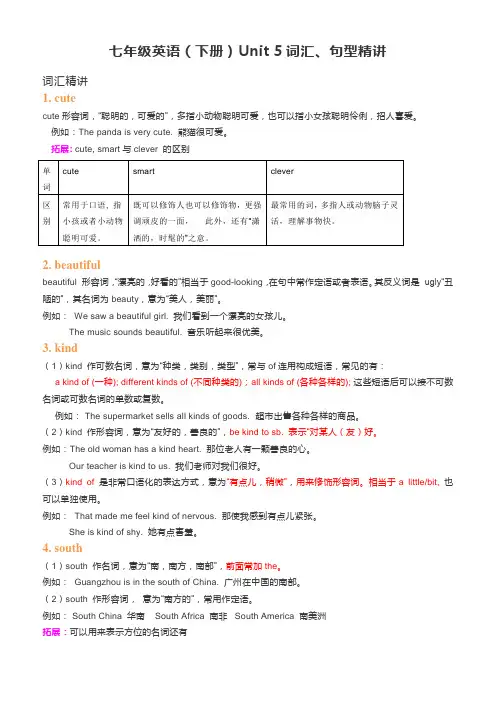
east(东),west(西),north(北), southeast (东南)southwest(西南), northwest (西北),northeast (东北)。
5. sleep(1)sleep作动词,意为“睡,睡觉”,指睡,睡着的全过程,强调睡眠的持续状态,后面可以跟副词或者介词。
例如:Don’t cry, the baby is sleeping. 别哭,那个婴儿在睡觉。
I can’t sleep because of the noise. 嘈杂声吵得我睡不着觉。
Did you sleep well last night? 你昨晚睡得好吗?(2)sleep 做名词,意为“睡觉,睡眠”,常为不可数名词。
但sleep前面有形容词时,可在前面加上a (an), 表示“一段……睡眠”。
词组go to sleep意为“入睡,睡着”。
例如:I need to have some sleep. 我需要睡一会儿。
Did you have a good sleep last night? 你昨天晚上睡得好吗?(3)asleep和sleepy 都是sleep的形容词形式。
asleep 表示“睡着的”,属于表语形容词,词组fall asleep 意为“睡着”;sleepy意为“困倦的,想入睡的”,既可以作定语也可以作表语。
例如:He fell asleep soon. 他很快睡着了。
I’m very sleepy. 我很困。
6. friendlyfriendly 是由名词friend + -ly 构成的形容词,意为“友好的”。
其反义词为unfriendly,意为“不友好的”。
例如:Chinese people are very friendly. 中国人民很友好。
类似的构词还有:love + -ly——lovely 可爱的mother + -ly —— motherly 母亲般的week + -ly —— weekly 每周的拓展:(1)be friendly to sb. 意为“对……友好”,指对别人态度好,热情;相当于“be kind to sb.”。
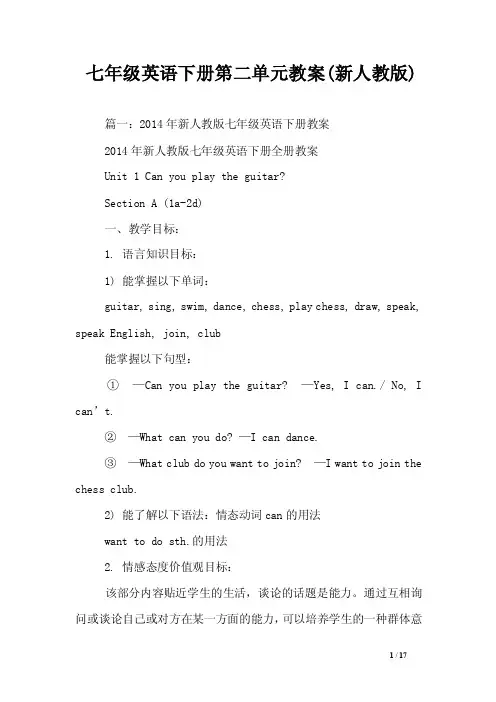
七年级英语下册第二单元教案(新人教版)篇一:2014年新人教版七年级英语下册教案2014年新人教版七年级英语下册全册教案Unit 1 Can you play the guitar?Section A (1a-2d)一、教学目标:1. 语言知识目标:1) 能掌握以下单词:guitar, sing, swim, dance, chess, play chess, draw, speak, speak English, join, club能掌握以下句型:①—Can you play the guitar? —Yes, I can./ No, I can’t.②—What can you do? —I can dance.③—What club do you want to join? —I want to join the chess club.2) 能了解以下语法:情态动词can的用法want to do sth.的用法2. 情感态度价值观目标:该部分内容贴近学生的生活,谈论的话题是能力。
通过互相询问或谈论自己或对方在某一方面的能力,可以培养学生的一种群体意识。
二、教学重难点1. 教学重点:1) 学习询问和谈论彼此的能力和特长;2) 掌握一些弹奏乐器的表达方式。
2. 教学难点:情态动词can的构成和使用。
三、教学过程Ⅰ. Lead in1. 教师可携带一些易于演奏的乐器,也可带一些演奏乐器的图片,一边演示乐器,一边说: I can play the guitar.…等;再指着图片说:He/She can play the violin.But I can’t play it.等;然后询问学生:Can you play the guitar?….并引导学生进行简单的回答。
2. Ss look at the picture in 1a. Then read the words and phrases. Let Ss match the activitieswith the people.Then Check the answers with the class together.Ⅱ. Presentation出示一些反映各种活动的图片、幻灯片或播放课件,引导学生谈论活动:He/She can dance/swim/sing/”··But I can’t dance/swim/sing/...等,学习表达活动的动词短语。
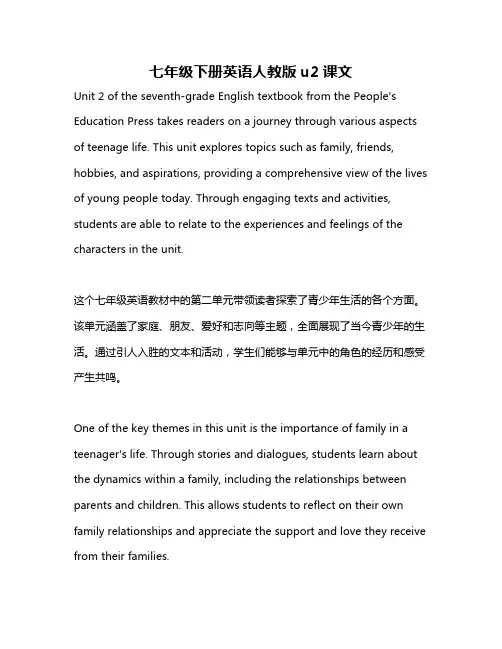
七年级下册英语人教版u2课文Unit 2 of the seventh-grade English textbook from the People's Education Press takes readers on a journey through various aspects of teenage life. This unit explores topics such as family, friends, hobbies, and aspirations, providing a comprehensive view of the lives of young people today. Through engaging texts and activities, students are able to relate to the experiences and feelings of the characters in the unit.这个七年级英语教材中的第二单元带领读者探索了青少年生活的各个方面。
该单元涵盖了家庭、朋友、爱好和志向等主题,全面展现了当今青少年的生活。
通过引人入胜的文本和活动,学生们能够与单元中的角色的经历和感受产生共鸣。
One of the key themes in this unit is the importance of family in a teenager's life. Through stories and dialogues, students learn about the dynamics within a family, including the relationships between parents and children. This allows students to reflect on their own family relationships and appreciate the support and love they receive from their families.该单元中的一个重要主题是家庭在青少年生活中的重要性。
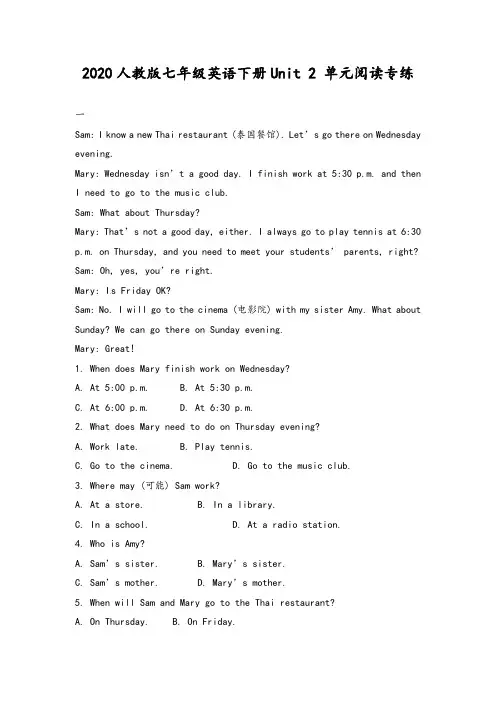
2020人教版七年级英语下册Unit 2 单元阅读专练一Sam: I know a new Thai restaurant (泰国餐馆). Let’s go there on Wednesday evening.Mary: Wednesday isn’t a good day. I finish work at 5:30 p.m. and then I need to go to the music club.Sam: What about Thursday?Mary: That’s not a good day, either. I always go to play tennis at 6:30 p.m. on Thursday, and you need to meet your students’ parents, right? Sam: Oh, yes, you’re right.Mary: Is Friday OK?Sam: No. I will go to the cinema (电影院) with my sister Amy. What about Sunday? We can go there on Sunday evening.Mary: Great!1. When does Mary finish work on Wednesday?A. At 5:00 p.m.B. At 5:30 p.m.C. At 6:00 p.m.D. At 6:30 p.m.2. What does Mary need to do on Thursday evening?A. Work late.B. Play tennis.C. Go to the cinema.D. Go to the music club.3. Where may (可能) Sam work?A. At a store.B. In a library.C. In a school.D. At a radio station.4. Who is Amy?A. Sam’s sister.B. Mary’s sister.C. Sam’s mother.D. Mary’s mother.5. When will Sam and Mary go to the Thai restaurant?A. On Thursday.B. On Friday.C. On Saturday.D. On Sunday.二Mr. Wang is our English teacher. He is more than (多于) fifty years old. He is tall and thin with black hair. He has a big nose and small eyes. He always wears a pair of glasses. He often wears a dark blue jacket and black pants. He is strict (严格的) at his work, but he is kind to us. He teaches English well. He often makes us laugh in his class. We all think English is very interesting. We all like him very much, too.1. How old is Mr. Wang?A. 50B. 45C. more than 50D. 382. What does Mr. Wang look like?A. tallB. shortC. niceD. heavy3. What does he always wear?A. a watchB. a pair of glassesC. a hatD. a sweater4. What color is his jacket?A. blackB. greenC. blueD. white5. How do the students think of Mr. Wang?A. He is interestingB. He is kindC. He teaches English.D. He is smart.三、My uncle Mike is a music teacher. He never gets up very late. He usually gets up at five o’clock in the morning. After he brushes his teeth, he often plays baseball with my aunt. Then he eats his breakfast. After that, he often plays the violin. At about 7:50, he takes the number 6 bus to his school. He has no classes on Thursday and Friday. He usually goes to the violin club. There he helps kids with the violin. Oh, my brother playsthe violin very well. Do you love to play the violin? Do you want to join the violin club? Please call my uncle at 116-3886.根据短文内容,判断下列句子正误。
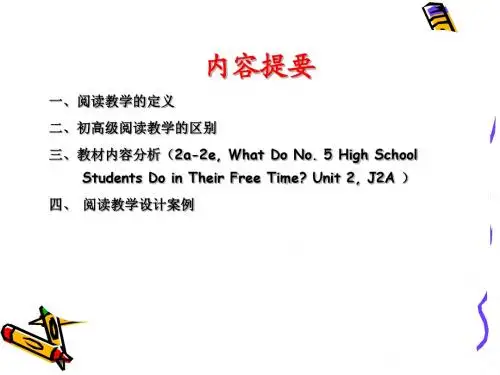
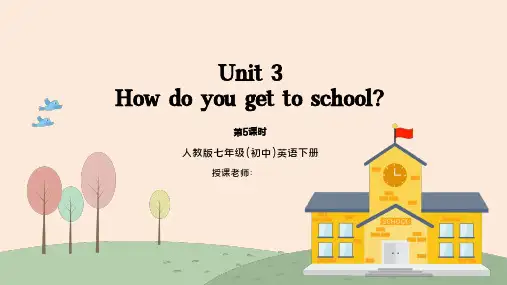
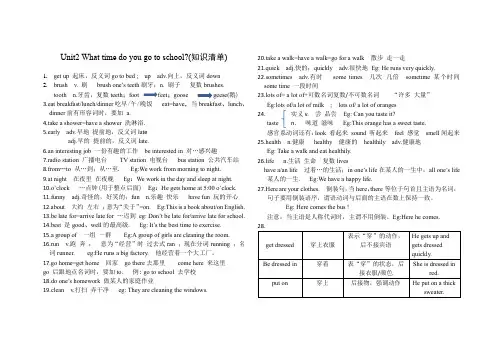
Unit2 What time do you go to school?(知识清单)1. get up 起床,反义词go to bed ; up adv.向上,反义词down2. brush v. 刷 brush one’s teeth 刷牙;n. 刷子 复数brushes.tooth n.牙齿,复数teeth ;footfeet ;goose geese(鹅) 3.eat breakfast/lunch/dinner 吃早/午/晚饭 eat=have ,当breakfast 、lunch 、dinner 前有形容词时,要加 a.4.take a shower=have a shower 洗淋浴.5.early adv.早地 提前地,反义词lat e adj.早的 提前的,反义词late.6.an interesting job 一份有趣的工作 be interested in 对…感兴趣7.radio station 广播电台 TV station 电视台 bus station 公共汽车站8.from …to 从…到;从…至. Eg:We work from morning to night.9.at night 在夜里 在夜晚 Eg :We work in the day and sleep at night. 10.o’clock …点钟(用于整点后面) Eg :He gets home at 5:00 o’clock. 11.funny adj.奇怪的,好笑的;fun n.乐趣 快乐 have fun 玩的开心 12.about 大约 左右 ;意为“关于”=on. Eg:This is a book about/on English. 13.be late for=arrive late for …迟到 eg: Don’t be late for/arrive late for school. 14.best 是good 、well 的最高级. Eg: It’s the best time to exercise. 15.a group of 一组 一群 Eg:A group of girls are cleaning the room.16.run v.跑 奔 ; 意为“经营”时 过去式ran ;现在分词running ;名词runner. eg:He runs a big factory. 他经营着一个大工厂。
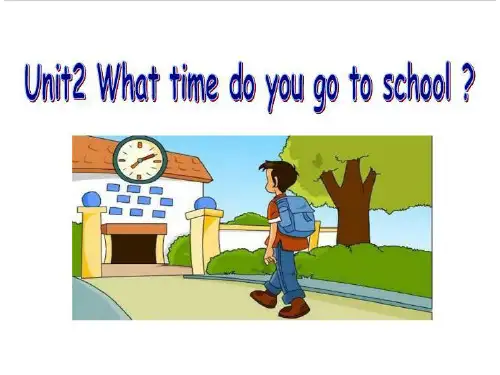
Unit 2 What time do you go to school? 单元大归纳短语归纳what time 几点go to school 去上学get up 起床take a shower 洗淋浴take a walk 散步brush teeth 刷牙get to 到达do homework 做家庭作业eat breakfast 吃早饭go to work 去上班go home 回家get home 到家either…or… 要么…要么… at night 在晚上get dressed 穿上衣服in the morning/ afternoon/ evening 在上午/下午/晚上be late for 迟到go to bed 上床睡觉lots of 许多,大量radio station 广播电台用法集萃at + 具体时间点在几点(几分)eat breakfast/ lunch/dinner吃早饭/午饭/晚饭from …to …从……到……thirty\half past +基数词……点半fifteen\a quarter to +基数词差一刻到……点need to do sth 需要做某事典句必背1. What time do you usually get up? I usually get up at six thirty.2. That’s a funny time for breakfast.3. When do students usually eat di nner?4. In the evening, I either watch TV or play computer games.5. At twelve, she eats lots of fruit and vegetables for lunch..6. She knows it’s not good for her, but it tastes good.7. Here are your clothes.unit2 巩固练习Ⅰ. 用适当的词填空,补全下面的短文。
Unit2 教材原文补充阅读2d Role-play the conversation.Interviewer: Scott has an interesting job. He works at a radio station. Scott, what time is your radio show?Scott: From twelve o’clock at night to six o’clock in the morning. Interviewer: What time do you usually get up?Scott: At eight thirty at night. Then I eat breakfast at nine. Interviewer: That's a funny time for breakfast!Scott: Yeah. After that, I usually exercise at about ten twenty. Interviewer: When do you go to work?Scott: At eleven o’clock, so I’m never late for work.阅读2d回答问题:1.Where does Scott work?2.What time does Scott’s radio show?3.What time does Scott usually get up?4.Does Scoot eat breakfast at ten?5.Why is Scoot never late for work?2b.Tony and Mary are brother and sister. They have healthy and unhealthy habits. Who is healthier? Circle the healthy activities.Hi!I'm Tony. I don't like to get up early. In the morning,I get up at eight. Then I go to school at eight thirty. I don't have much time for breakfast, so I usually eat very quickly. For lunch, I usually eat hamburgers. After school, I sometimes play basketball for half an hour. When I get home,I always do my homework first. In the evening, I either watch TV or play computer games. At ten thirty, I brush my teeth and then I go to bed.Mary is my sister. She usually gets up at six thirty. Then she always takes a shower and eatsand vegetables for lunch. After lunch, she sometimes plays volleyball. She always eats ice-cream after dinner.She knows it's not good for her, but it tastes good! In the evening, she does her homework and usually swims or takes a walk. At nine thirty, she goes to bed.阅读2b回答问题:6.Does Tony like get up early?7.What time does Tony get up?8.What does Tony usually eat for lunch?9.What does Tony do in the evening?10.What’s Tony’s sister’s name?11.What time does Mary go to school?12.What does Mary eat for lunch?13.Does Mary eat ice-cream?14.What time does Mary go to bed?15.Who is healthier?课文语法填空:Tony doesn't like (get)up early. In the morning,He gets up eight. Then He goes to school at eight thirty. He doesn’t have much time for breakfast, so he usually eats very (quick). lunch, he usually eats (hamburger). After school, he sometimes plays basketball for half hour. When he gets home,I always does (he) homework first. In the evening, he either watches TV or play computer games. At ten thirty, he (brush) his teeth and then he goes to bed.Mary is (Tony) sister. She usually gets up at six thirty. Then she always takes aeats of fruit and vegetables for lunch. After lunch, she sometimes volleyball. She always eats ice-cream after dinner.She knows it's not good her, but it good! In the evening, she does her homework and usually swims or takes a walk. At nine thirty, she goes to bed.答案:1.At a radio station.2. From twelve o’clock at night to six o’clock in the morning.3.At eight thirty at night.4.No, he doesn’t.5. Because he goes to work a t eleven o’clock.6.No, he doesn’t.7.At eight.8. Hamburgers.9.He either watches TV or plays computer games.10.Mary11.At eight thirty.12.She eats lots of fruit and vegetables13.Yes, she does.14.At nine thirty.15.Mary.语法填空:to get at quickly For hamburgers an his brushes Tony’s lots plays for tastes。
人教版七年级下册英语Unit 5 说课稿一. 教材分析人教版七年级下册英语Unit 5主要讲述了日常生活中的一些活动,如做家务、上学、看电影等。
本单元的核心词汇有housework, homework, watch, read, sports 等,同时本单元还涉及到一般现在时的用法。
通过本单元的学习,学生能够掌握日常生活中的一些基本表达,并能用英语描述自己的日常活动。
二. 学情分析七年级的学生已经具备了一定的英语基础,能够进行简单的英语交流。
但是,部分学生对于一般现在时的用法还不是很清楚,需要老师在教学中进行详细的解释和引导。
此外,学生在口语表达方面还存在一定的困难,需要老师提供更多的机会进行实践和锻炼。
三. 说教学目标1.知识目标:学生能够掌握Unit 5中的核心词汇和短语,理解一般现在时的用法。
2.能力目标:学生能够用英语描述自己的日常活动,进行简单的交流。
3.情感目标:通过学习,学生能够培养对英语的兴趣,增强学习的自信心。
四. 说教学重难点1.重点:学生能够掌握Unit 5中的核心词汇和短语,理解一般现在时的用法。
2.难点:学生能够运用一般现在时描述自己的日常活动,并进行口语交流。
五. 说教学方法与手段1.教学方法:采用任务型教学法,让学生在实际操作中掌握知识,提高能力。
2.教学手段:利用多媒体课件、图片、卡片等辅助教学,增加课堂的趣味性。
六. 说教学过程1.导入:通过展示图片,引导学生谈论自己喜欢的活动,引出本课主题。
2.新课呈现:通过多媒体课件,展示本课的核心词汇和短语,讲解一般现在时的用法。
3.操练:学生分组进行角色扮演,运用一般现在时描述自己的日常活动。
4.巩固:学生完成课堂练习,检测对知识的掌握情况。
5.拓展:引导学生谈论自己的梦想,用英语表达对未来生活的期望。
6.总结:对本课内容进行总结,强调一般现在时的用法。
七. 说板书设计板书设计如下:人教版七年级下册英语Unit 5核心词汇:housework, homework, watch, read, sports等一般现在时:主语 + 动词原形八. 说教学评价1.课堂参与度:观察学生在课堂上的参与情况,是否积极回答问题,参与讨论。
Unit2Whattimedoyougotoschool?短语·集萃1.getup起床2.either…or…或者…或者…;要么…要么…3.getdressed穿上衣服4.lotsof大量5.takeashower洗澡6.gotobed上床睡觉7.radiostation广播台8.dohomework做家庭作业9.gotoschool去上学10.eatdinner吃晚饭11.burshteeth刷牙齿12.takeawalk散步13.belatefor因……迟到14.cleanmyroom打扫我的房间15.needtodosth需要做某事16.havetimetodosth有时间做某事17.from…to…从…到…18.onweekends在周末=ontheweekend句式·记忆4.1.getinterested3.o’clock4.fun与①funny②funIt’5.4:30p.m.8:14读作6.halfa(7.quarter①gotobed强调“上床睡觉”的动作及过程,无“睡着”的意思。
②gotosleep强调“入睡;睡着”这一动作,强调人已经“睡着”。
9.quickly,fast和soon的区别:①quickly迅速的强调动作发生或完成得快,也可指人的思维敏捷。
②fast迅速的强调运动速度之快,既可做形容词,也可作副词。
可与quickly互换。
③soon不久以后侧重两件事情的先后发生,中间的间隔的时间很短。
Eg:1)Thenextmorning,theteacheraskedtheboy,“Howdidyoufindtheanswersoquickly?”第二天早上,老师问这个男孩:“你怎么能够这样快找到了答案的呢?”2)YouarealwayssayingIamgrowingsofast.你老是说,我长得很快。
3)Soontheywereinthemiddleoftheriver.很快他们就到了河中间。
unit2(5)导学案课题课型复习执笔人教研组长级部审核时间第二周第 5 导学稿审核签字教师寄语No man can do two things at once. 一心不可二用。
学习目标教学重点学会写一段话谈论自己的日常生活,及日常作息时间。
教学难点在训练阅读能力和写作能力的基础上继续谈论人们的日常生活。
教学方法自主预习、任务型教学、合作学习教学过程I. 词汇I.翻译词组 1.起床___2.洗淋浴___3.睡觉____ 4.大量;许多____ 5.广播电台___6.要么…要么__7.穿上衣服___ II.用所给单词的适当形式填空1. What time ______ he usually ______(go) to bed?2. Scott______ (work) very long hours.3. The food in the boxes _______(be) very delicious.4. His parents usually_______ (get)up at five.5. What about _______(listen) to the music.6. Tom isn't good at _______(speak) Japanese.7. His sister __________(want, join) the music club.8. They are busy ________ (have) lunch.9. Jack, _______ (put) on your raincoat(雨衣).10. It’s time _______ (go) home now.B) 根据首字母或汉语提示完成各句所缺单词11. What t______ do you usually get up?12. T______ for your letter.13. School s______ at n ine o’clock.14. My mother gets up at _______(大约)7 o’clock.15. My dad usua lly takes a ______(洗澡) in the morning.II. 选择填空1. ―What’s the time? ―______ half past nine.A. ItsB. It’sC. This isD. They’re2. He eats ______ dinner at 7:30 in the evening. A. a B. an C. the D. /3. Please write and tell me ______ your morning. A. for B. to C. about D. of4. ______ Lucy and Lily go home at seven? A. Do B. Does C. Is D. Are5. It’s ten o’clock. I must go ______. A. to home B. home C. my home D. his home6. I want to______ No. 5 bus to Tian’an Men Square. A. get B. come C. go D. take7. What time does Jane ______ after school? A. do her homework B. d oes her homework C. do her homeworks D. does her homeworks8. Do you want to listen to the ______ story? A. funnily B. funny C. funy D. funer9. My English teacher is usually very busy______. A. a ll night B. night C. all the night D. good night10. Can you think ______? A. what is his job B. what does his job C. what his job does D. what his job is11. We go to ______ at six thirty in the morning. A. the school B. a school C. school D. schools12. ---______ does your mother work? ---In a school.A. What B. How C. Where D. When13. ---What time is it? ---It’s ______ eight o’clock. A. at B. on C. in D. around14. He often takes ______ to the Saite Hotel. A. number bus 17 B. the number 17 bus C. 17 number bus D. number 17 bus15. I ______ at ten o’clock in the evening. A. have breakfast B. get up C. go to bed D. watch morning TVIII. 根据汉语意思完成下列各句英译,每空一词1. 我的弟弟在下午做家庭作业。